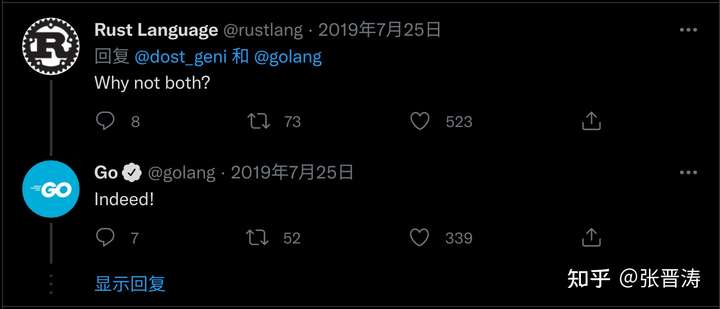

Go 和 Rust 我都要!
source link: https://zhuanlan.zhihu.com/p/437948182
Go to the source link to view the article. You can view the picture content, updated content and better typesetting reading experience. If the link is broken, please click the button below to view the snapshot at that time.
Go 和 Rust 我都要!
大家好,我是张晋涛。
近期 Rust 社区/团队有些变动,所以再一次将 Rust 拉到大多数人眼前。
我最近看到很多小伙伴说的话:
“ Rust 还值得学吗?社区是不是不稳定呀”
“ Rust 和 Go 哪个好?”
“ Rust 还值得学吗?”
这些问题如果有人来问我,那我的回答是:
小孩子才做选择,我都要!
当然,关于 Rust 和 Go 的问题也不算新,比如之前的一条推文:

我在本篇中就来介绍下如何用 Go 调用 Rust。
当然,这篇中我基本上不会去比较 Go 和 Rust 的功能,或者这种方式的性能之类的,Just for Fun
FFI 和 Binding
FFI (Foreign Function Interface) 翻译过来叫做外部函数接口(为了比较简单,下文中都将使用 FFI 指代)。最早来自于 Common Lisp 的规范,这是在 wiki 上写的,我并没有去考证。 不过我所使用过的绝大多数语言中都有 FFI 的概念/术语存在,比如:Python、Ruby, Haskell、Go、Rust、LuaJIT 等。
FFI 的作用简单来说就是允许一种语言去调用另一种语言,有时候我们也会用 Binding 来表示类似的能力。
在不同的语言中会有不同的实现,比如在 Go 中的 cgo , Python 中的 ctypes , Haskell 中的 CAPI (之前还有一个 ccall)等。 我个人感觉 Haskell 中用 FFI 相比其他语言要更简单&方便的多,不过这不是本篇的重点就不展开了。
在本文中,对于 Go 和 Rust 而言,它们的 FFI 需要与 C 语言对象进行通信,而这部分其实是由操作系统根据 API 中的调用约定来完成的。
我们来进入正题。
准备 Rust 示例程序
Rust 的安装和 Cargo 工具的基本使用,这里就不介绍了。大家可以去 Rust 的官网进行了解。
用 Cargo 创建项目
我们先准备一个目录用来放本次示例的代码。(我创建的目录叫做 go-rust )
然后使用 Rust 的 Cargo 工具创建一个名叫 rustdemo 的项目,这里由于我增加了 --lib 的选项,使用其内置的 library 模板。
➜ go-rust git:(master) ✗ mkdir lib && cd lib
➜ go-rust git:(master) ✗ cargo new --lib rustdemo
Created library `rustdemo` package
➜ go-rust git:(master) ✗ tree rustdemo
rustdemo
├── Cargo.toml
└── src
└── lib.rs
1 directory, 2 files
准备 Rust 代码
extern crate libc;
use std::ffi::{CStr, CString};
#[no_mangle]
pub extern "C" fn rustdemo(name: *const libc::c_char) -> *const libc::c_char {
let cstr_name = unsafe { CStr::from_ptr(name) };
let mut str_name = cstr_name.to_str().unwrap().to_string();
println!("Rust get Input: \"{}\"", str_name);
let r_string: &str = " Rust say: Hello Go ";
str_name.push_str(r_string);
CString::new(str_name).unwrap().into_raw()
}
代码比较简单,Rust 暴露出来的函数名叫做 rustdemo ,接收一个外部的参数,并将其打印出来。之后从 Rust 这边再设置一个字符串。
CString::new(str_name).unwrap().into_raw() 被转换为原始指针,以便之后由 C 语言处理。
编译 Rust 代码
我们需要修改下 Cargo.toml 文件以便进行编译。注意,这里我们增加了 crate-type = ["cdylib"] 和 libc 。
[package]
name = "rustdemo"
version = "0.1.0"
edition = "2021"
[lib]
crate-type = ["cdylib"]
[dependencies]
libc = "0.2"然后进行编译
➜ rustdemo git:(master) ✗ cargo build --release
Compiling rustdemo v0.1.0 (/home/tao/go/src/github.com/tao12345666333/go-rust/lib/rustdemo)
Finished release [optimized] target(s) in 0.22s
查看生成的文件,这是一个 .so 文件(这是因为我在 Linux 环境下,你如果在其他系统环境下会不同)
➜ rustdemo git:(master) ✗ ls target/release/librustdemo.so
target/release/librustdemo.so
准备 Go 代码
Go 环境的安装之类的这里也不再赘述了,继续在我们的 go-rust 目录操作即可。
编写 main.go
package main
/*
#cgo LDFLAGS: -L./lib -lrustdemo
#include <stdlib.h>
#include "./lib/rustdemo.h"
*/
import "C"
import (
"fmt"
"unsafe"
)
func main() {
s := "Go say: Hello Rust"
input := C.CString(s)
defer C.free(unsafe.Pointer(input))
o := C.rustdemo(input)
output := C.GoString(o)
fmt.Printf("%s\n", output)
}
在这里我们使用了 cgo ,在 import "C" 之前的注释内容是一种特殊的语法,这里是正常的 C 代码,其中需要声明使用到的头文件之类的。
下面的代码很简单,定义了一个字符串,传递给 rustdemo 函数,然后打印 C 处理后的字符串。
同时,为了能够让 Go 程序能正常调用 Rust 函数,这里我们还需要声明其头文件,在 lib/rustdemo.h 中写入如下内容:
char* rustdemo(char *name);
编译代码
在 Go 编译的时候,我们需要开启 CGO (默认都是开启的),同时需要链接到 Rust 构建出来的 rustdemo.so 文件,所以我们将该文件和它的头文件放到 lib 目录下。
➜ go-rust git:(master) ✗ cp lib/rustdemo/target/release/librustdemo.so lib
所以完整的目录结构就是:
➜ go-rust git:(master) ✗ tree -L 2 ..├── go.mod├── lib│ ├── librustdemo.so│ ├── rustdemo│ └── rustdemo.h└── main.go2 directories, 5 files
➜ go-rust git:(master) ✗ go build -o go-rust -ldflags="-r ./lib" main.go➜ go-rust git:(master) ✗ ./go-rust Rust get Input: "Go say: Hello Rust"Go say: Hello Rust Rust say: Hello Go
可以看到,第一行的输出是由 Go 传入了 Rust , 第二行中则是从 Rust 再传回 Go 的了。符合我们的预期。
总结
本篇介绍了如何使用 Go 与 Rust 进行结合,介绍了其前置关于 FFI 相关的知识,后续通过一个小的实践演示了其完整过程。 感兴趣的小伙伴可以自行实践下。
欢迎订阅我的文章公众号【MoeLove】
Recommend
About Joyk
Aggregate valuable and interesting links.
Joyk means Joy of geeK